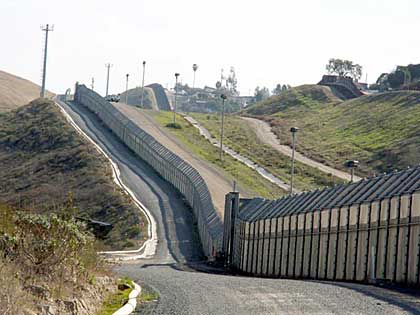
 |
|
|
|
Border wall harming wildlife  The border wall prevents animals from reaching water sources and blocks travel and migration routes for jaguars, ocelots, jaguarondi, deer, and wolves. Photo by Jay Johnson-Castro. Construction of the controversial wall between the United States and Mexico built by the Bush Administration and touted by the Department of Homeland Security not only blocks passage by people, it is harming wildlife and has destroyed large swaths of critical habitat. The Bush Administration envisioned 670 miles of wall on the southern border of the U.S. Over 600 miles of the wall have been built. In constructing this barrier, the Department of Homeland Security has dispensed with more than 30 laws enacted to protect public lands and wildlife. Michael Chertoff, former Head of the Department of Homeland Security, has waived the Endangered Species Act, the Clean Water Act, the Wilderness Act, the National Environmental Policy Act and other laws under the power given to him by Congress with the Real ID Act of 2005. This law gives the Department of Homeland Security the power to waive any local, state, or federal law that interferes with construction of a physical barrier on U.S. borders. In 2006 when the Defenders of Wildlife obtained a court order halting construction of the wall in the fragile San Pedro Riparian National Conservation Area in Arizona, Chertoff invoked the Real ID Act, and the construction resumed. The wall prevents animals from reaching water sources and blocks travel and migration routes for jaguars, ocelots, jaguarondi, deer, and wolves. Wall construction has destroyed habitat for cactus-dwelling pygmy owls, thick-billed parrots, the Mexican vine snake, and other species. Even the Bush EPA expressed concern about habitat fragmentation, the lack of proper assessment of construction sites, lack of consideration of alternatives, imprecise and non-quantitative language in the planning documents, and other issues. The Real ID Act enabled Homeland Security to ignore these concerns. How to help • To get involved and learn more contact Lynne Simpson, 475-7767 or . |
|